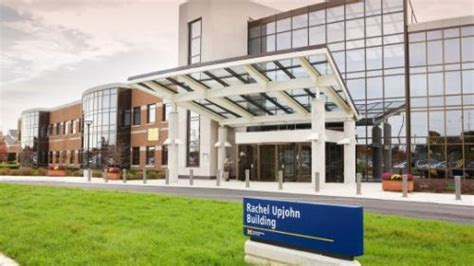The Rachel Upjohn Building, located on the campus of the University of Michigan in Ann Arbor, is a significant structure that serves as the home of the University of Michigan Department of Psychiatry. This building is named after Rachel Upjohn, a prominent figure in the history of psychiatric care and a member of the Upjohn family, known for their contributions to the pharmaceutical industry and philanthropic efforts. The building itself is a testament to the evolution of psychiatric care and education, reflecting the advances in the field over the years.
Historical Context and Significance

The Rachel Upjohn Building stands as a physical manifestation of the commitment to mental health care and research at the University of Michigan. The history of the building is intertwined with the development of psychiatric services and educational programs at the university, highlighting the growth and advancements in the understanding and treatment of mental health disorders. Over the years, the building has undergone transformations to accommodate the expanding needs of the department, incorporating state-of-the-art facilities for patient care, research, and education.
Architectural and Design Features
The architectural design of the Rachel Upjohn Building is noteworthy for its blend of functionality and aesthetic appeal. The structure is designed to provide a welcoming and therapeutic environment, essential for the well-being of patients and the productivity of staff and students. The building’s layout includes spacious areas for clinical services, research laboratories, educational facilities, and administrative offices. The incorporation of natural light, green spaces, and carefully selected interior design elements contributes to a positive and supportive atmosphere, reflecting the understanding that the physical environment plays a crucial role in mental health and recovery.
| Facility Features | Description |
|---|---|
| Clinical Services | Comprehensive mental health services, including outpatient clinics and specialized treatment programs. |
| Research Laboratories | State-of-the-art facilities for conducting research in psychiatry, focusing on the biological, psychological, and social aspects of mental health. |
| Educational Facilities | Classrooms, lecture halls, and seminar rooms equipped with advanced technology to support educational programs for medical students, residents, and mental health professionals. |
| Administrative Offices | Spaces for faculty, staff, and administrative personnel, facilitating the management and coordination of departmental activities. |

Key Points
- The Rachel Upjohn Building is a critical component of the University of Michigan's psychiatric care and educational infrastructure.
- The building's design prioritizes both functionality and therapeutic environment, acknowledging the impact of physical space on mental health outcomes.
- It houses a range of facilities, including clinical services, research laboratories, educational spaces, and administrative offices, supporting a holistic approach to mental health care and education.
- The building's naming recognizes the contributions of Rachel Upjohn and the Upjohn family to psychiatric care and philanthropy, underscoring the importance of support and funding for mental health initiatives.
- The University of Michigan's Department of Psychiatry, based in the Rachel Upjohn Building, is at the forefront of research, education, and clinical practice in psychiatry, contributing significantly to the advancement of the field.
Role in Psychiatric Education and Research

The Rachel Upjohn Building plays a pivotal role in the education of future psychiatrists and mental health professionals. The building is equipped with advanced educational facilities, including classrooms and simulation labs, where students can engage in immersive learning experiences. The department’s residency program, based in the building, offers comprehensive training in clinical psychiatry, preparing residents for successful careers in patient care, research, and academia. Furthermore, the building’s research laboratories are hubs for innovative research, exploring the biological underpinnings of mental health disorders, developing new treatments, and investigating the social determinants of mental health.
Community Impact and Outreach
Beyond its role in education and research, the Rachel Upjohn Building is a center for community outreach and engagement. The building hosts numerous events, seminars, and workshops aimed at raising awareness about mental health issues, reducing stigma, and promoting wellness. The department’s clinicians and researchers often collaborate with community organizations to develop and implement programs tailored to the specific needs of local populations, demonstrating a commitment to public service and community health.
Meta Description: Discover the significance of the Rachel Upjohn Building at the University of Michigan, a hub for psychiatric care, education, and research, advancing our understanding and treatment of mental health disorders.
What services are offered at the Rachel Upjohn Building?
+The Rachel Upjohn Building offers comprehensive mental health services, including outpatient clinics, specialized treatment programs, research participation opportunities, and educational programs for mental health professionals.
How does the building contribute to psychiatric research?
+The building houses state-of-the-art research laboratories where faculty and students conduct studies on the causes, consequences, and treatments of mental health disorders, contributing to the advancement of psychiatric knowledge and practice.
What is the significance of the building’s name?
+The building is named after Rachel Upjohn, acknowledging her and the Upjohn family’s philanthropic contributions to psychiatric care and education, symbolizing the importance of support for mental health initiatives.
